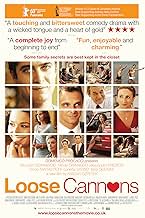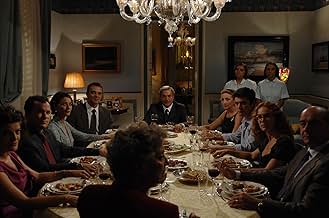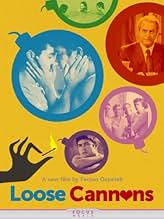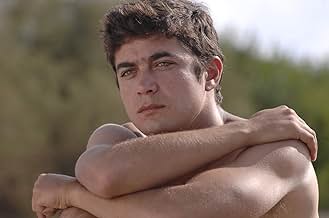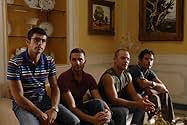VALUTAZIONE IMDb
7,2/10
13.883
LA TUA VALUTAZIONE
Tommaso è il figlio più giovane dei Cantones, una famiglia dell'Italia meridionale che gestisce un'attività di pasta dagli anni '60. Vuole raccontare ai genitori la verità su se stesso ma il... Leggi tuttoTommaso è il figlio più giovane dei Cantones, una famiglia dell'Italia meridionale che gestisce un'attività di pasta dagli anni '60. Vuole raccontare ai genitori la verità su se stesso ma il fratello maggiore Antonio rovina i suoi piani.Tommaso è il figlio più giovane dei Cantones, una famiglia dell'Italia meridionale che gestisce un'attività di pasta dagli anni '60. Vuole raccontare ai genitori la verità su se stesso ma il fratello maggiore Antonio rovina i suoi piani.
- Regia
- Sceneggiatura
- Star
- Premi
- 34 vittorie e 34 candidature totali
Recensioni in evidenza
I saw this movie at the Chicago International Film Festival, along with 18 other movies, and it was, by far, the best movie in the festival. It was the only movie I attended that was applauded by the audience at the end of the film. I see that one of the film critics commented that the film was uneven because it couldn't make up its mind whether it was a comedy or a drama. It was both and worked on both levels, which is one of the reasons I loved it. it made me laugh and it made me cry. I think the best art is often like that. Gabriel Garcia Marquez' book "100 Years of Solitude" and Joseph Heller's "Catch 22" are examples of books that are very funny and very sad, sometimes for exactly the same reasons. I hope this film will be nominated for an Academy Award for Best Foreign Language Film. It deserves the recognition.
Loose Cannons (Mine vaganti) is a beautiful movie about a young gay man in a large, loving and eccentric Southern Italian family. His plan to free himself from the family pasta business by coming out as gay misfires early in the movie, and the remaining ninety minutes cover how his dilemma is resolved.
But this is far, far more than a coming-out movie. Themes of life and death and family and love and loss and immortality run like deep, rich rivers of life throughout the story; it is astonishing how much emotional ground is covered so effectively and gracefully in so little time. Each one of the dozen or so highly differentiated characters is fully and richly developed, and not one of them is short-changed or stereotyped.
I bought Loose Cannons because I have loved the earlier works of Ferzan Ozpetec, particularly His Secret Life (Le fate ignoranti), Facing Windows (La finestra di fronte), Sacred Heart (Cuore sacro), and - most of all - Saturn in Opposition (Saturno contro), but Loose Cannons surpasses them all. Each of its predecessors had minor flaws and occasional weak moments, but Loose Cannons has none.
As usual in his movies, photography, sets and music are highly original and perfectly fitted to the story: if it were a silent movie it would be beautiful just to look at; if it were a radio program it would be delightful just to listen to. This is the first of his movies to integrate a significant amount of comedy into his usually serious but highly imaginative dramas, and he does it expertly; I laughed out loud almost as often as I wept with delight.
This movie is a masterpiece. I cannot imagine how a better movie could ever be made; but Ozpetec is young still, so I am confident he will do it somehow. I can say without any reservation at all that this is the best movie I have ever seen.
But this is far, far more than a coming-out movie. Themes of life and death and family and love and loss and immortality run like deep, rich rivers of life throughout the story; it is astonishing how much emotional ground is covered so effectively and gracefully in so little time. Each one of the dozen or so highly differentiated characters is fully and richly developed, and not one of them is short-changed or stereotyped.
I bought Loose Cannons because I have loved the earlier works of Ferzan Ozpetec, particularly His Secret Life (Le fate ignoranti), Facing Windows (La finestra di fronte), Sacred Heart (Cuore sacro), and - most of all - Saturn in Opposition (Saturno contro), but Loose Cannons surpasses them all. Each of its predecessors had minor flaws and occasional weak moments, but Loose Cannons has none.
As usual in his movies, photography, sets and music are highly original and perfectly fitted to the story: if it were a silent movie it would be beautiful just to look at; if it were a radio program it would be delightful just to listen to. This is the first of his movies to integrate a significant amount of comedy into his usually serious but highly imaginative dramas, and he does it expertly; I laughed out loud almost as often as I wept with delight.
This movie is a masterpiece. I cannot imagine how a better movie could ever be made; but Ozpetec is young still, so I am confident he will do it somehow. I can say without any reservation at all that this is the best movie I have ever seen.
For a film in which each character harbours some tragic secret - of unrequited love, betrayal, unfulfilled ambition, alcoholism, a death wish or suchlike – Ferzan Özpetek's Loose Cannons is surprisingly uplifting.
In this family drama/rom-com-with-a-twist, the Istanbul-born Italian director combines precise aesthetics with good-looking actors, but, regrettably, Loose Cannons is also full of all-too-predictable stereotypes. This makes the film, despite its underlying theme of the pressures of stifling social conformism, easy on the eye and light of heart. Think Festen meets Women on the Verge of a Nervous Breakdown.
The loose cannons of the title are found amongst the Cantone family, the owners of a pasta factory in Puglia, in southern Italy. The father, Vincenzo, has decided that the time has come to hand over responsibilities to his sons, Antonio and Tommaso. His daughter's husband being an imbecile and his daughter being a woman, the brothers are the obvious heirs to the family business.
Tommaso, ostensibly enrolled in business school in Rome but actually a gay literature student with a novel freshly submitted to a publisher, returns home for a pompous dinner where Vincenzo plans to announce the generational handover in front of the entire family and some new business associates. Tommaso, having just confided in his brother that he is planning to use the occasion to reveal his literary and same-sex relationship aspirations, is himself taken by surprise at the dinner: Antonio beats him to it, coming out of the closet and triggering a heart attack in his father.
Antonio is disowned and Tommaso, afraid that opening up about his gayness would be a final death knell for his father, reluctantly steps in to manage the factory with the assistance of Alba, a beautiful young family friend with a nose for business deals and eye-catching pasta packaging. No matter how hard he tries, even caressing the freshly-baked pasta every morning as his grandfather used to, Tommaso can't develop a passion for macaroni. He wants to get back to Rome, to his writing and his gay lover, a bookish doctor.
While the film centres on Tommaso and his dilemmas, Loose Cannons has an assortment of characters with an assortment of repressed emotions. There's the homophobic and patriarchal father; the outwardly stoic, but in reality sensitive, mother; the daughter stuck in a passionless marriage with a podgy husband and two chubby daughters; the spinster auntie indiscreetly drenching her sorrows in whiskey; the diabetic grandmother dishing out pearls of wisdom; and the ugly, frustrated maid.
Though Loose Cannons is never dull, with plenty of narrative twists, flashback scenes and regular introductions of new characters, all the typecasting soon grates. The scenes with the multi-generational, loud- mouth Cantone family gathering around tables brimming with food quickly come to feel like quirky pasta adverts.
The film is marked by clichés from the outset. The opening scene, which turns out to be a flashback sequence into the past of granny Cantone, couldn't be more kitsch: a beautiful, teary-eyed young bride runs up the steep staircase of a solitary stone house, where she confronts a man, his shirt unbuttoned at the neck, with a gun – first aimed at him, then pressed against her own chest. The man tries to wrangle the gun out of the bride's hand, at which point the film cuts to a shot of the house's exterior and the banging sound of a gun shot is heard.
Things don't get better when, during a transitional phase of the film, Tommaso's gay friends from Rome show up for a surprise visit. Tommaso's parents convince them to stay overnight – cue camp homos who try to act straight but still can't help admire Alba's dress or flirt with Tommaso's brother-in-law. During a trip to the beach, the boys perform a silly coordinated dance before splashing each other with water. It's funny, but so predictable. At times, it's hard to tell whether all the typecasting and melodrama is done knowingly or is just crass.
For a film exploring the themes of family obligations, tradition, clash of values, sexuality and love, you'd be better off watching Özpetek's Hamam: The Turkish Bath from 1997. Still, the graceful final scene of Loose Cannons, set to the melancholic tones of Turkish diva Sezen Aksu's 'Kutlama' (Celebration), is almost enough to redeem the conventional and clapped-out feel that colours most of the movie.
In this family drama/rom-com-with-a-twist, the Istanbul-born Italian director combines precise aesthetics with good-looking actors, but, regrettably, Loose Cannons is also full of all-too-predictable stereotypes. This makes the film, despite its underlying theme of the pressures of stifling social conformism, easy on the eye and light of heart. Think Festen meets Women on the Verge of a Nervous Breakdown.
The loose cannons of the title are found amongst the Cantone family, the owners of a pasta factory in Puglia, in southern Italy. The father, Vincenzo, has decided that the time has come to hand over responsibilities to his sons, Antonio and Tommaso. His daughter's husband being an imbecile and his daughter being a woman, the brothers are the obvious heirs to the family business.
Tommaso, ostensibly enrolled in business school in Rome but actually a gay literature student with a novel freshly submitted to a publisher, returns home for a pompous dinner where Vincenzo plans to announce the generational handover in front of the entire family and some new business associates. Tommaso, having just confided in his brother that he is planning to use the occasion to reveal his literary and same-sex relationship aspirations, is himself taken by surprise at the dinner: Antonio beats him to it, coming out of the closet and triggering a heart attack in his father.
Antonio is disowned and Tommaso, afraid that opening up about his gayness would be a final death knell for his father, reluctantly steps in to manage the factory with the assistance of Alba, a beautiful young family friend with a nose for business deals and eye-catching pasta packaging. No matter how hard he tries, even caressing the freshly-baked pasta every morning as his grandfather used to, Tommaso can't develop a passion for macaroni. He wants to get back to Rome, to his writing and his gay lover, a bookish doctor.
While the film centres on Tommaso and his dilemmas, Loose Cannons has an assortment of characters with an assortment of repressed emotions. There's the homophobic and patriarchal father; the outwardly stoic, but in reality sensitive, mother; the daughter stuck in a passionless marriage with a podgy husband and two chubby daughters; the spinster auntie indiscreetly drenching her sorrows in whiskey; the diabetic grandmother dishing out pearls of wisdom; and the ugly, frustrated maid.
Though Loose Cannons is never dull, with plenty of narrative twists, flashback scenes and regular introductions of new characters, all the typecasting soon grates. The scenes with the multi-generational, loud- mouth Cantone family gathering around tables brimming with food quickly come to feel like quirky pasta adverts.
The film is marked by clichés from the outset. The opening scene, which turns out to be a flashback sequence into the past of granny Cantone, couldn't be more kitsch: a beautiful, teary-eyed young bride runs up the steep staircase of a solitary stone house, where she confronts a man, his shirt unbuttoned at the neck, with a gun – first aimed at him, then pressed against her own chest. The man tries to wrangle the gun out of the bride's hand, at which point the film cuts to a shot of the house's exterior and the banging sound of a gun shot is heard.
Things don't get better when, during a transitional phase of the film, Tommaso's gay friends from Rome show up for a surprise visit. Tommaso's parents convince them to stay overnight – cue camp homos who try to act straight but still can't help admire Alba's dress or flirt with Tommaso's brother-in-law. During a trip to the beach, the boys perform a silly coordinated dance before splashing each other with water. It's funny, but so predictable. At times, it's hard to tell whether all the typecasting and melodrama is done knowingly or is just crass.
For a film exploring the themes of family obligations, tradition, clash of values, sexuality and love, you'd be better off watching Özpetek's Hamam: The Turkish Bath from 1997. Still, the graceful final scene of Loose Cannons, set to the melancholic tones of Turkish diva Sezen Aksu's 'Kutlama' (Celebration), is almost enough to redeem the conventional and clapped-out feel that colours most of the movie.
Although, the director wasn't born in Italy ( he is of Turkish origin), he had made a movie in very Italian style.
First, let me write about a music. It is phenomenal. My favourite choice is Nina Zilli's song "50 mila" - very fresh, soulful and "remind me of summer" track. Italian movies are often associated with good music - so I wasn't surprise with great soundtrack. What amazed me the most, was the great acting. Riccardo Scamarcio as Tommaso was good but Ilaria Ochcini as his grandmother was the greatest character in this movie. Strong, powerful, self-confident and witty.
A third thing I want to mention is the story. I'm a gay person so I could easy wear in Tomasso shoes. The story was believable, interesting and very bitter-sweet.
I recommend this title to everyone who like warm, funny comedy-drama. I bet you'll like it for sure.
First, let me write about a music. It is phenomenal. My favourite choice is Nina Zilli's song "50 mila" - very fresh, soulful and "remind me of summer" track. Italian movies are often associated with good music - so I wasn't surprise with great soundtrack. What amazed me the most, was the great acting. Riccardo Scamarcio as Tommaso was good but Ilaria Ochcini as his grandmother was the greatest character in this movie. Strong, powerful, self-confident and witty.
A third thing I want to mention is the story. I'm a gay person so I could easy wear in Tomasso shoes. The story was believable, interesting and very bitter-sweet.
I recommend this title to everyone who like warm, funny comedy-drama. I bet you'll like it for sure.
I thought this was a fabulous film, really worth going to see. The acting was superb and it was beautifully shot. I thought the main storyline was great, to me it was really believable, obviously there were over the top elements to add comedy value, but even in this age there are parents who don't except their children being gay. However, whilst I thought the main story was great I didn't think the side story lines quite melded into the film, the story with the grandmother and Nicolo, and the other with Alba (don't want to give away too much, for me didn't quite work. I also think the story with the brother could have been explored more throughly. This film is well worth a couple of hours of your time, despite the ending I still came out smiling. For those of you who aren't too keen on gay scenes there is only one kiss in this film. This film is more about family, expectations and how we all strive not to disappoint our parents. Don't miss it.
Lo sapevi?
- ConnessioniRemade as Quem Vai Ficar com Mário? (2021)
I più visti
Accedi per valutare e creare un elenco di titoli salvati per ottenere consigli personalizzati
- How long is Loose Cannons?Powered by Alexa
Dettagli
Botteghino
- Lordo in tutto il mondo
- 15.340.429 USD
- Tempo di esecuzione
- 1h 50min(110 min)
- Colore
- Mix di suoni
- Proporzioni
- 2.35 : 1
Contribuisci a questa pagina
Suggerisci una modifica o aggiungi i contenuti mancanti



